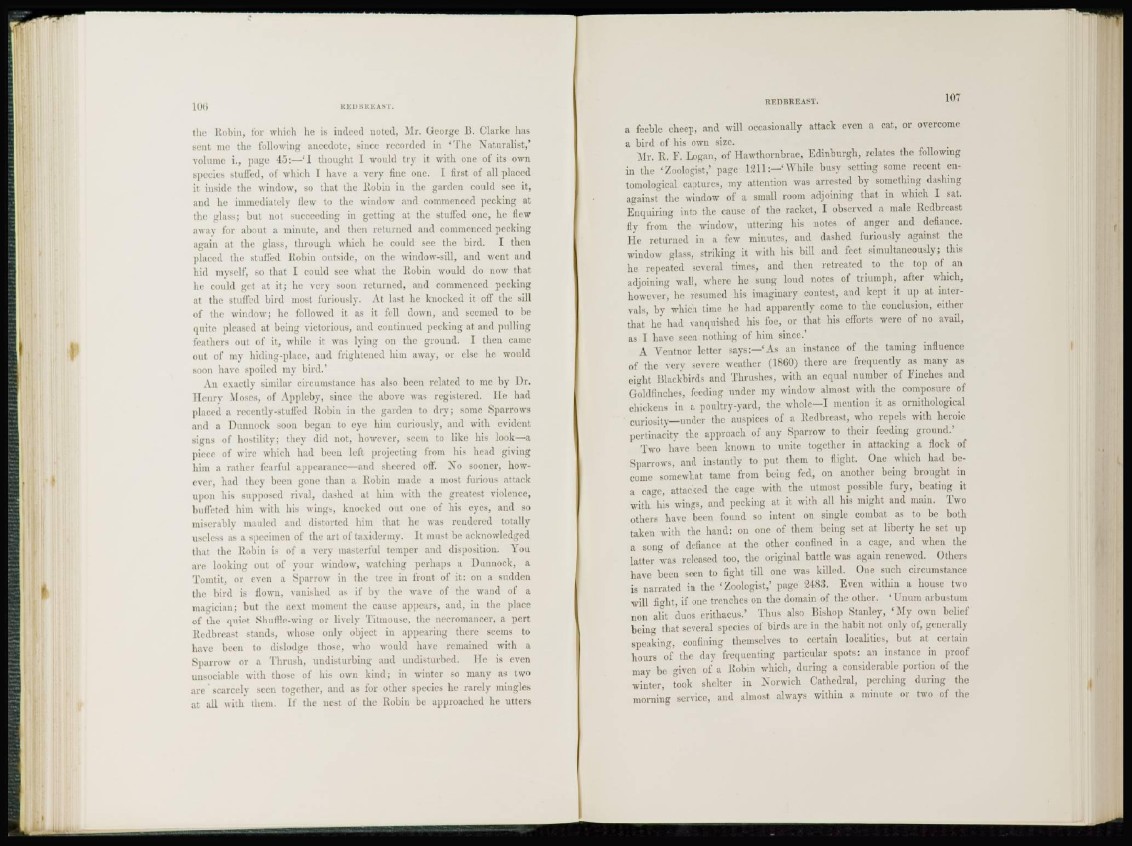
the Rubin, for which he is indeed noted, Mr. George 13. Clarke has
sent me the following anecdote, since recorded in ' T h e Naturalist,'
volume i., page 45:—'I thought I would try it with one of its own
species stuffed, of which 1 have a very fine one. I first of all placed
it inside the window, so that the Robin in the garden could see it,
and he immediately flew to the window and commenced pecking at
the glass; but not succeeding in getting at the stuffed one, he flew
away for aboul a minute, and then returned and commenced pecking
again at the glass, through which he could see the bird. I then
placed the stuffed Hobin outside, on t he window-sill, and went and
hid myself, so that I could see what the Robin would do now that
he could get at i t ; he very soon returned, and commenced pecking
at the stuffed bird most furiously. At last he knocked it off the sill
of the window; he followed it as it fell down, and seemed to be
quite pleased at being victorious, and continued pecking at and polling
feathers ou1 of it, while it was lying on the ground. I then came
out of my hiding-place, and frightened him away, or else he would
soon have spoiled my bird.'
An exactly similar circumstance has also been related to me by Dr.
Henry Moses, of Appleby, since the above was registered. He had
placed a recently-stuffed Robin in the garden to d r y ; some Sparrows
and a Dunnock soon began to eye him curiously, and with evident
signs of hostility; they did not, however, seem to like his look—a
piece of wire which had been left projecting from his head giving
him a rather fearful appearance—and sheered off. No sooner, however,
had they been gone than a Robin made a most furious attack
upon his supposed rival, dashed at him with the greatest violence,
buffeted him with his wings, knocked out one of his eyes, and so
miserably mauled and distorted him that he was rendered totally
useless as a specimen of the art of taxidermy. It must be acknowledged
that the Robin is of a very masterful temper and disposition. You
are looking out of your window, watching perhaps a Dunnock, a
Tomtit, or even a Sparrow- in the tree in front of i t : on a sudden
the bird is flown, vanished as if by the wave of the wand of a
magician; but the next moment the cause appears, and, in the place
of the quiet Shuffle-wing or lively Titmouse, the necromancer, a pert
Redbreast stands, whose only object in appearing there seems to
have been to dislodge those, who would have remained with a
Sparrow or a Thrush, undisturbing and undisturbed. He is even
unsociable with those of his own kind; in winter so many as two
are scarcely seen together, and as for other species he rarely mingles
at all with them. It the nest of the Robin be approached he utters
REDBREAST. 107
a feeble cheep, and will occasionally attack even a cat, or overcome
a bird of his own size.
Mr. R. F. Logan, of llawthornbrae, Edinburgh, relates the following
in the 'Zoologist,' page 1211:—'While busy setting some recent entomological
captures, my attention was arrested by something dashing
against the window of a small room adjoining that in which I sat.
Enquiring into the cause of the racket, I observed a male Redbreast
fly from the window, uttering his notes of anger and defiance.
He returned in a few minutes, and dashed furiously against the
window glass, striking it with his bill and feet simultaneously; this
he repeated several times, and then retreated to the top of an
adjoining wall, where he sung loud notes of triumph, after which,
however, he resumed his imaginary contest, and kept it up at intervals,
by which time he had apparently come to the conclusion, either
that he had vanquished his foe, or that his efforts were of no avail,
as I have seen nothing of him since.'
A Ventnor letter says:—'As an instance of the taming influence
of the very severe weather (1H(J0) there are frequently as manv as
eight Blackbirds and Thrushes, with an equal number of Finches and
Goldfinches, feeding under my window almost with the composure of
chickens in a poultry-yard, the whole—I mention it as ornithological
curiosity—under the auspices of a Redbreast, who repels with heroic
pertinacity the approach of any Sparrow to their feeding ground.'
Two have been known to unite together in attacking a flock of
Sparrows, and instantly to put them to flight. One which had become
somewhat tame from being fed, on another being brought in
a cage, attacked the cage with the utmost possible fury, beating it
with his wings, and pecking at it with all his might and main. Two
others have been found so intent on single combat as to be both
taken with the hand: on one of them being set at liberty he set u p
a song of defiance at the other confined in a cage, and when the
latter was released too, the original battle was again renewed. Others
have been seen to fight till one was killed. One such circumstance
is narrated in the 'Zoologist,' page 2483. Even within a house two
will fight, if one trenches on the domain of tin; other. ' Unmn arbustum
non alit duos erithacus.' Thus also Bishop Stanley, ' M y own belief
being that several species of birds are in the habit not only of, generally
speaking, confining themselves to certain localities, hut at certain
hours of the day frequenting particular spots: an instance in proof
may be given of a Robin which, during a considerable portion of the
winter, took shelter in Norwich Cathedral, perching during the
morning service, and almost always within a minute or two of t h e